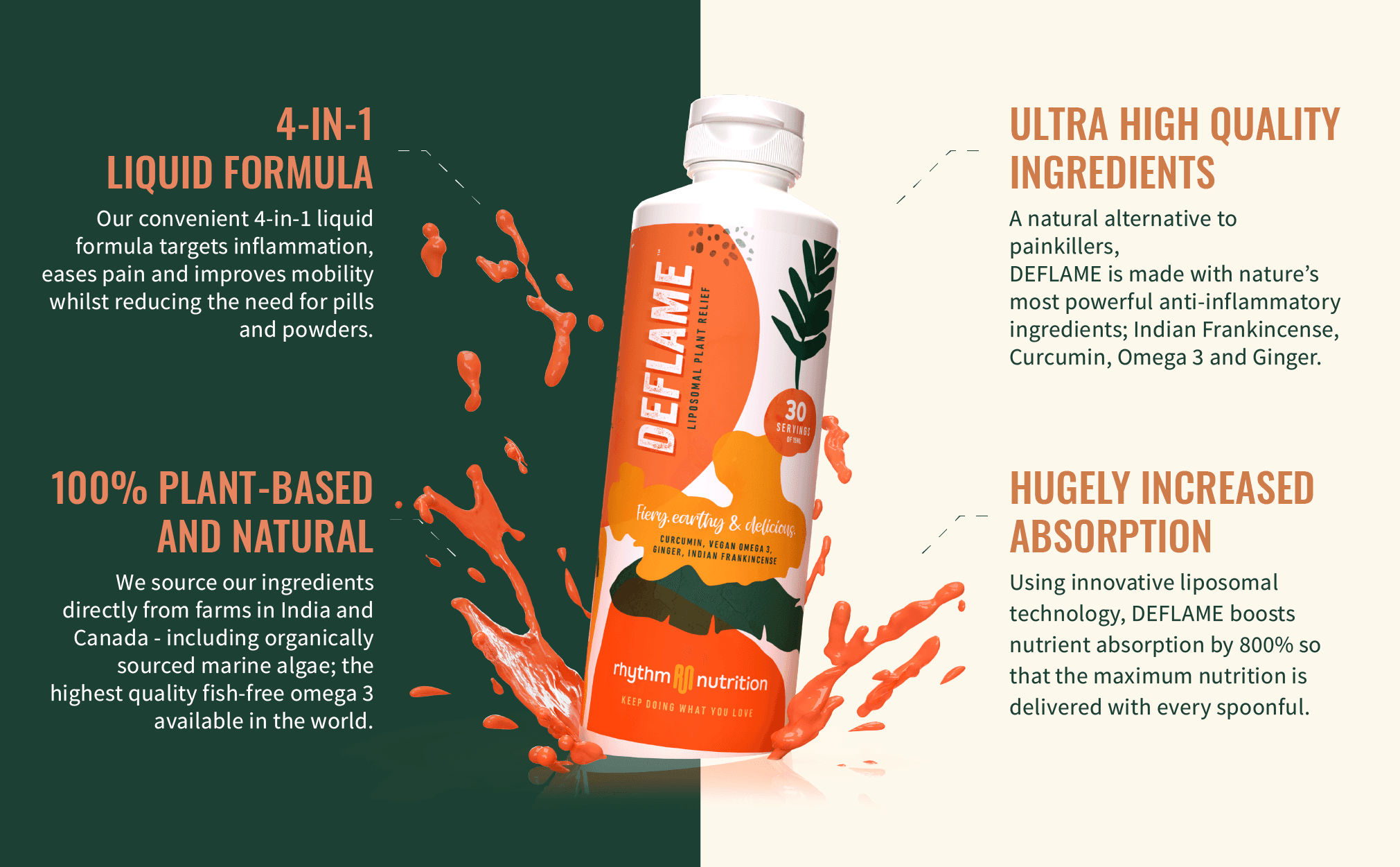Eating to support Rheumatoid Arthritis
Anyone living with rheumatoid arthritis knows that it can be extremely debilitating. It can mean you are unable to do even simple tasks without pain, and can leave you feeling lethargic and drained, even after a less-than-busy day. Fortunately, your diet and lifestyle can have a real impact on symptom frequency and severity. In this article, I’ll be exploring how you can implement small changes to your diet to reduce inflammation and lift some of those aches and pains.
What is rheumatoid arthritis?
Rheumatoid arthritis is an auto-immune condition, meaning that the body’s immune system attacks healthy cells. In this condition, the eyes, heart and lungs can all be affected, as well as synovial joints, but as a systemic disease it can affect the whole body. The most commonly affected joints are the smaller ones, such as in the hands and feet, but it can also target the hips, knees and shoulder joints too. When a flare up occurs, the joint lining becomes inflamed and swollen, which in time damages the joint surface, causing extreme tenderness, pain, swelling and loss of movement (1).
How can I eat to support rheumatoid arthritis?
As rheumatoid arthritis is linked to inflammation, eating an array of anti-inflammatory foods can help to reduce associated swelling and pain. The easiest way to do this is to follow a Mediterranean-style diet, as it is full of antioxidant compounds which can reduce inflammation (you can read more about the Mediterranean diet’s powerful anti-inflammatory effects here). In fact, a recent review of studies found that a Mediterranean-style diet was effective at reducing pain and increasing physical function in people living with rheumatoid arthritis (2). To follow this way of eating, include plenty of fruits and vegetables in your diet, along with nuts, seeds, beans, peas, legumes, whole grains and healthy oils (especially olive oil). Moderate amount of some animal foods including fish, seafood, cheese, eggs, yoghurt and poultry are permitted, while red meat and highly processed foods are limited as these can increase levels of inflammatory markers.
Those living with rheumatoid arthritis are also at increased risk of developing heart disease (3), so it is really important to eat to protect your heart too - luckily the Mediterranean diet does just that. It is also important to regularly include oily fish in your diet, as it is one of the best sources of anti-inflammatory omega-3 fatty acids (LINK TO FATS ARTICLE), as well as healthy fats from olive oil, nuts, seeds, eggs and avocado - these healthy fats help to reduce the risk of developing heart disease while also exhibiting anti-inflammatory properties which can help relieve symptoms of arthritis (4) - not to mention, they are delicious! As many of you experiencing rheumatoid arthritis will know, tiredness is a key symptom of the condition. Furthermore, during ‘flare ups’, iron absorption can become impaired, which can result in iron-deficiency anaemia, further exacerbating tiredness (5). As such, be sure to include iron-rich foods in your diet on a regular basis, such as red meat, dark leafy greens, eggs, beans, peas and lentils, and eat them with a source of vitamin C (think fruits and vegetables!) which enhances iron absorption.
Nightshade vegetables (such as aubergine, peppers, tomatoes and potatoes) can also be an issue for some people with the condition; it is thought that a chemical called solanine found in nightshade vegetables may aggravate arthritic pain and inflammation (6). However, there is very limited scientific evidence to back up this theory, so if you enjoy them and notice no flare up of symptoms, there’s no reason you can’t enjoy these nutritious vegetables. If you feel they may be a problem for you, try cutting them out for a period of time before reintroducing them to see if any symptoms arise. If so, you may want to remove them from your diet, but be sure to replace them with lots of other fruit and vegetables to ensure you are getting enough essential vitamins and minerals, as well as the anti-inflammatory compounds they also contain.
Finally, anti-inflammatory supplements can be extremely useful for helping to reduce pain and stiffness. DEFLAME contains 4 potent natural anti-inflammatory ingredients in convenient liquid format (great for those of you fed up with the amount of pills you have to take a day!). It has curcumin from turmeric, ginger, indian frankincense and it also contains vegan omega-3 from marine algae, which is cleaner, richer source of omega 3 and perfect if you don’t like or choose not to eat oily fish. It is delivered using liposomal technology which makes it incomparable to pills and powders in terms of the results that you can expect!

Start implementing these changes to your diet and I know you’ll notice some improvement in your symptoms. As always, I love to hear from you so let me know how you get on and if you have any questions, please drop a comment below.
References:
McInnes, I.B. et al. 2017. Pathogenetic insights from the treatment of rheumatoid arthritis. The Lancet, 389(10086):10-16
Forsyth, C. et al. 2018. The effects of the Mediterranean diet on rheumatoid arthritis prevention and treatment: a systematic review of human prospective studies. Rheumatology International, 38(5):737-747
Crowson, C.S. et al. 2013. Rheumatoid Arthritis and Cardiovascular Disease. American Heart Journal, 166(4):622-628
Arthritis Foundation. 2020. The Ultimate Arthritis Diet. Available at: https://www.arthritis.org/health-wellness/healthy-living/nutrition/anti-inflammatory/the-ultimate-arthritis-diet (Accessed: 31st October 2020)
The British Dietetics Association. 2020. Rheumatoid Arthritis and Diet: Food Fact Sheet. Available at: https://www.bda.uk.com/resource/rheumatoid-arthritis-diet.html (Accessed: 31st October 2020)
British Nutrition Foundation. 2020. Healthy eating tips for people with arthritis. Available at: https://www.nutrition.org.uk/healthyliving/healthissues/arthritis.html?start=5&__cf_chl_jschl_tk__=9ae53634fd8ca689004f278c9e84a1844468336c-1604223658-0-Aeszk_XBw_QneCcvYAOnxbtqX457wqsEkr5cdvr02yopDUpJEzE_WWC0UUWfueqMgEWldUOu-1NuOZ6H62nvlBigkKSrsTI1-WlO5L-ZnWmWyopIppdgTNHVVqA3IGsCFAExRcnZj5DUeJz_xYi83Zry6MVjrGgzcIOR6miaqsNMwse6nl8TMy9Ghu13-VrpyLhlvtAOyGo9HeGP62PeMzQMV_NNmZr6ZQ4CMFQKEKzav68VCJc-VccgJRR8gnhMxTjK15Vq5sPL7UjbGheIEZY_fiiPYwI9EAqcMtGJjYl7DXZ3johOrLghnD1SO9CxLDhZqQFOdyLk7MjkCopGhNARQDynpXYSgfiA41f7C-McJxt5CYcB8-11IVXE-myP_PtFFaU1m0Y8e8i36ECDE3o (Accessed: 31st October 2020

